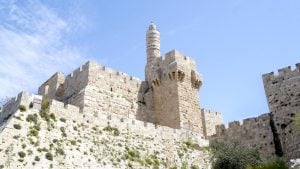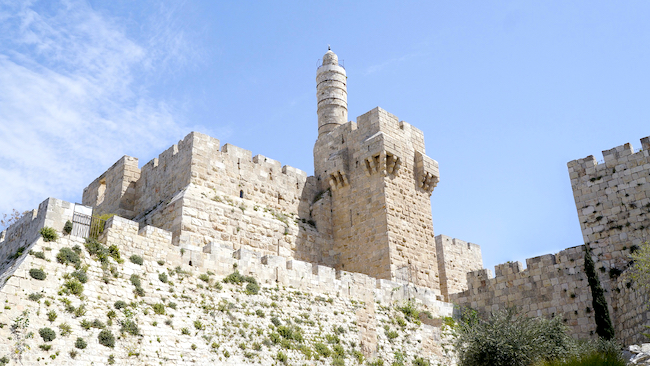
Zecharya 2:14
This week’s haftorah gives us a profound insight into the spiritual direction of our present exile and final redemption. The haftorah begins with the prophet Zecharya experiencing a vision wherein the ordained High Priest, Yehoshua, was brought to a critical trial regarding his pending esteemed position. Zecharya says, “And I was shown the High Priest Yehoshua standing before Hashem’s prosecuting angel.” (3:1) The reason for this prosecution is stated shortly thereafter in the following words,”And Yehoshua was clothed with soiled garments.” (3:3) Our Chazal explain that these garments refer to the wives of Yehoshua’s descendants. Although Yehoshua was personally a very pious individual some of his children were adversely affected by the foreign environment of Babylonia. They strayed from their rich heritage of priesthood and married women prohibited to them due to their lofty ritual status. Because of this offense to the priesthood, Yehoshua’s personal status of the High Priest was under severe scrutiny.
Suddenly, an angel of Hashem interceded on behalf of Yehoshua and defeated the prosecuting angel with the following statement of defense. “Is Yehoshua not an ember rescued from the fire!? (3:2) This response of defense was quite favorable in the eyes of Hashem and Yehoshua was immediately restored to his lofty position. The angel responded and said,”Remove the soiled garments from upon Yehoshua… See that I have removed his sin from him… Dress him with new garments.” The prophet continues,”And they placed the pure priestly turban on his head.” (3:4) Rashi (adloc.) explains that Yehoshua was granted the opportunity of rectifying his children’s behavior and he successfully influenced them to divorce their wives and marry more appropriate ones. Once Yehoshua’s garments -referring to his children’s inappropriate spouses – were cleansed Hashem clothed Yehoshua with the priestly garb and restored him to the position of Kohain Gadol.
What was the angel’s powerful defense that produced such immediate favorable results? After his sons’ disgrace to the priesthood, what outstanding merit could Yehoshua have possessed that secured his lofty position? The Radak explains that the angel argued that Yehoshua was “an ember rescued from fire.” Radak understands this to mean that Yehoshua had been previously thrown into a fiery furnace. He sacrificed his life for the sake of Hashem and was miraculously spared from the fire. Through this heroic act, Yehoshua demonstrated total submission for the sake of Heaven offering his life for Hashem’s glory. Such individuals deserve to prominently serve Hashem and His people. Such devotion and commitment must be inculcated into the blood stream of the Jewish people. Although Yehoshua’s children veered from the straight path there remained much hope for them.
The shining example of their father could surely inspire them to return from their inappropriate ways. They too could eventually become devout servants of Hashem and attain lofty levels of priesthood. Through their father’s guidance they could also rise above their physical and mundane pursuits and develop the purest qualities. In fact, Yehoshua was told that his children could potentially perfect themselves beyond normal levels of human achievement. Hashem said, “I will establish them superior to these angels standing here.” (3:7) Yes, Yehoshua’s submissiveness could produce untold results and certainly lead his children back to perfect spirituality.
This same lesson is taught to us in this week’s parsha regarding the newly appointed judges. We read about the masses of Jewish people straying from the perfect path demonstrating serious leanings towards certain physical and inappropriate dimensions of life. They disgraced the Heavenly manna bread which Hashem sent them on a daily basis and expressed their physical cravings for substitute foods such as; melons, onions and garlic. They even complained about the Torah’s strict standards of morality and sought freedom from its taxing and demanding life. Hashem responded with a severe punishment which ended the lives of many thousands of Jewish people. But at the same time Hashem responded to a plea from Moshe Rabbeinu and instituted a structure of seventy elders to share the judicial responsibilities. During this process these hand-picked judges experienced an incredible transition. The Torah states, “And Hashem intensified the Heavenly Spirit which rested upon Moshe Rabbeinu and shared it with the seventy elders.” (Bamidbar 11:25) In addition to their new position asjudges, these elders received prophecy and merited for a short time, to actually serve as a sanctuary for the Divine Presence.
Rashi comments on this incident and reveals the secret identity of the seventy elders. He quotes Chazal who explain, “These were the Jewish policemen in Egypt who were beaten mercilessly instead of their Jewish brethren.” (Rashi to Bamidbar 11:16) These elders refused to enforce upon their brethren the unreasonable Egyptian demands and opted to accept torturous Egyptian blows on behalf of their brethren. This previous heroic act of self negation now served as a meaningful merit and lesson for the Jewish people. The recent outburst of the Jewish people revealed that they were embarking upon an immoral path, focusing on pleasure and self pursuit. Hashem responded to this by elevating a host of their own peers to the lofty position of leadership. These elders were not ensnared by self pursuit but were instead perfect role models of self negation. Their interest lay in spiritual association with Hashem and their selfless efforts brought them to the lofty achievement of personal sanctuaries for the presence of Hashem. With such personalities at the head of the Jewish people their direction could be effectively reversed. Their self sacrifice could secure the Jewish survival and hopefully remind the Jewish people never to plunge into self pursuit and immorality.
In our present times we hear repeated vibes of similar physical calls to immorality. We realize that our predecessors were also embers rescued from the fiery furnace – the fires of Europe – and their self sacrifice for the sake of Hashem surely serves as an everlasting merit for us. Our recollections of their total devotion to Hashem is a significant factor in the incredible transition for many of us from total physical pursuits to a sincere yearning to become sanctuaries of Hashem. May this new development continue to flourish and contribute to the hastening of Mashiach we so anxiously await.


